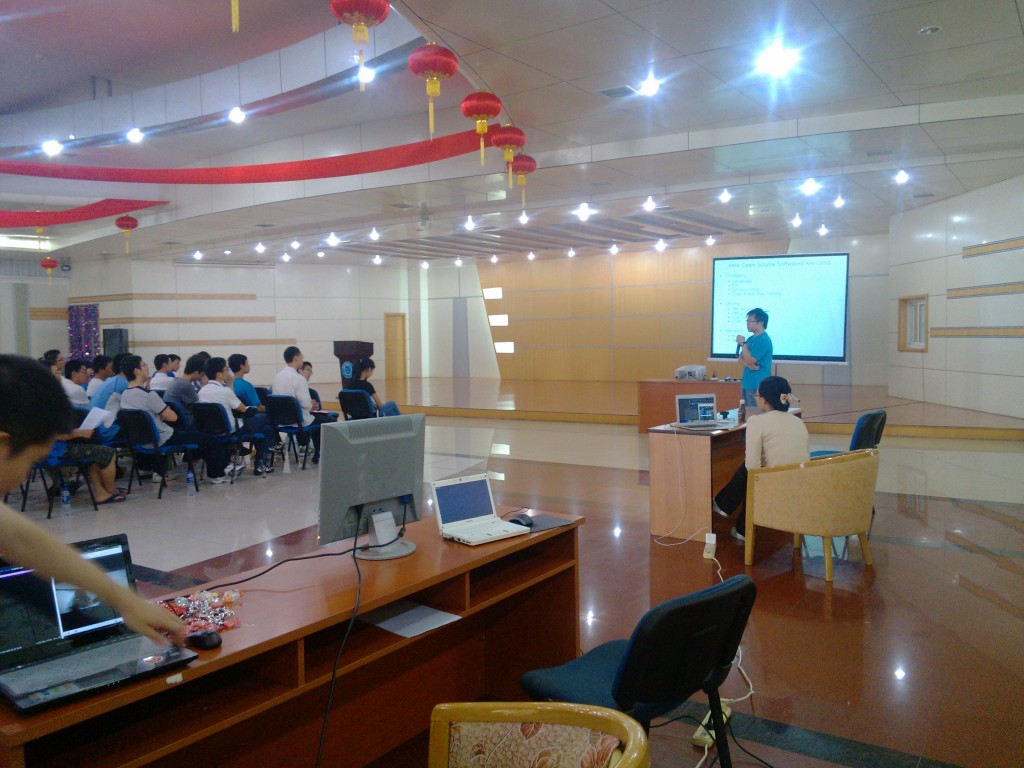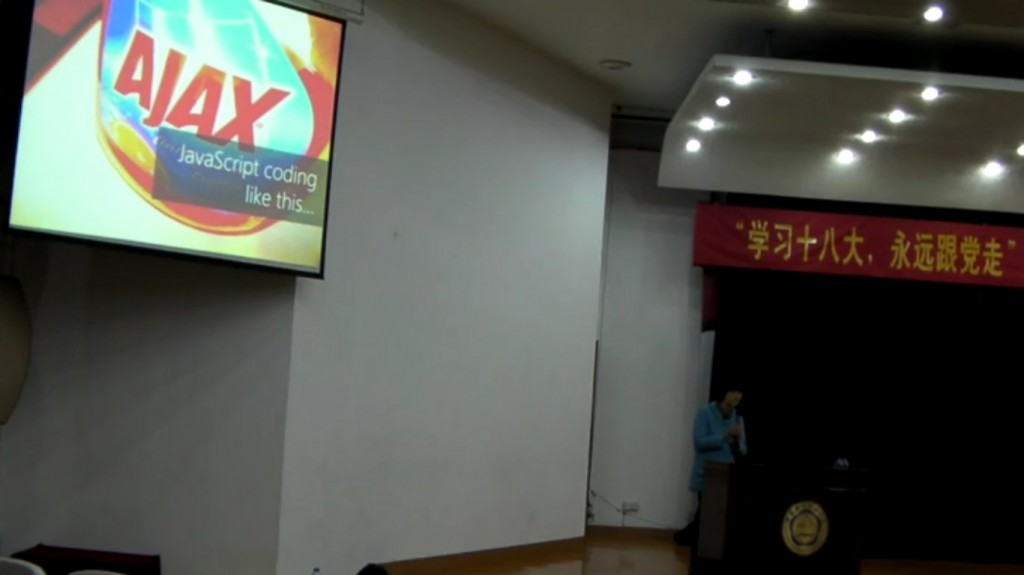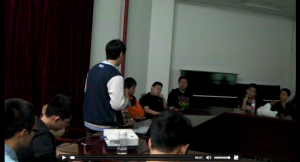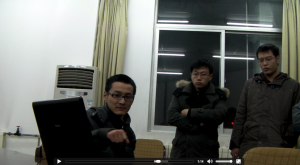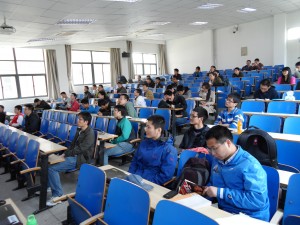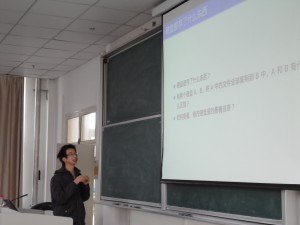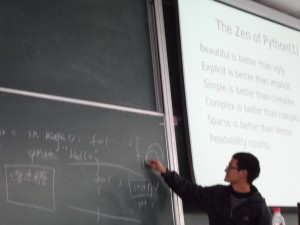My Year in LUG
Today, Guangyu said that he wanted a summary of last year’s work, so this article came into being. The main work of LUG is divided into activities and network services.
Activities
Let’s review what happened in the past year (http://lug.ustc.edu.cn/wiki/lug/events)
Recruitment
Together with other clubs, we set up stalls in the second week of school, in the east and west activities. The stolen experience is: you can make some display boards and roll-ups to increase the exposure rate.
Although recruitment is quite hard, it’s fun to chat with students from various departments, and handing out flyers can also taste the often rejected taste. Gossip, the current president of LUG’s sister was found at that time~
SFD 2012
Software Freedom Day, held in the multi-function hall of West Activities on September 15, 2012.
According to the suggestion of Chen Zhang, this activity first adopted the form of booth display, and there were 6~8 booths on the spot to show the different styles of free software. The event invited Zhang Cheng as a guest. The event was broadcast live online for the first time through “Fengyun Live”.
When I summarize a job, I see more shortcomings, so that we can avoid falling into the same trap again. So I hope my hard-working friends don’t mind.
- The venue was booked too late, and due to time conflicts, the event time was advanced from Sunday afternoon to Saturday morning. The venue must be booked more than two weeks in advance.
- The preparation was rushed. Because there were other activities the night before, the venue was set up the next morning. In fact, we should have set up the venue as soon as their event ended.
- Some promotional materials were printed on the morning of the event, which was a bit nervous. I’m not used to urging people to do things, nor am I used to paying attention to the progress of other people’s responsibilities. This is absolutely impossible.
- No one was in charge of taking pictures at the scene, causing many wonderful moments to be missed.
Visit to the Network Center
On October 14, 2012, as in previous years, we visited the campus network information center under the leadership of teachers such as Zhang Huanjie. There was nothing wrong with the pre-event publicity and organization of this event.
Because we wanted to live broadcast the event and wanted to record the video, but there were some problems with the configuration at the time, which caused Meow and I to live broadcast with a tablet, and I was carrying a notebook to record the video. When the event was about to end, Teacher Zhang Huanjie suddenly had something to do. When we walked to the hall, because I was carrying a notebook to record the video, I didn’t hold the scene, many people left, so there was no group photo left, which is a pity. The lesson of this incident is that during the event, we should focus on holding the scene. If there are not enough people, we can cancel the live broadcast or video recording. We can’t do thankless things.
Linux User Party
On November 24, 2012, the Linux User Party was held in the Water Report Hall of the East District.
SFD 2012 first invited students from brother universities as guests. This time we invited Guo Jiabao, the author of “node.js Development Guide”, to introduce node.js. This node.js lecture is of far-reaching significance, making many LUG students start to pay attention to functional programming and asynchronous I/O models. We should hold more such enlightening lectures in the future.
This event also invited Professor Li Huimin to give a lecture on high-performance computing. LUG CTO Guo Jiahua explained iptables. Li Meow and I introduced some network services of LUG. This event arranged too much content, and it ended at 18:30.
Regrettably, USTC Blog was not released as scheduled at this event. This is the result of my procrastination. I only started to rush to work a week before the event. The slides of the speech were not spared from procrastination. The day before the event, Tux and I spent a sleepless night on the 25th floor of Hanhai Constellation. On the morning of November 27, USTC Blog Alpha was released. In the blink of an eye, a year has passed, and the promised functions and official versions are still in the Todo List. I underestimated the workload required for development. A seemingly simple function may take a long time to implement, especially when you are not familiar with the technology used.
The news I wrote was a bit CCAV, and I was attacked in the mailing list. In fact, Aenon Sun told me privately later that CCAV is also a kind of humor. But the press release can indeed be written more lively.
Weekly Gathering
The weekly gathering is an activity that mimics SHLUG’s Hacking Thursday. It is held in the 324 conference room of West Activities every Saturday night. The predecessor of the weekly gathering is the “Website Development Discussion Class” co-organized by me and Li Meow in the Network Work Office in the fall of 2011. Outsiders, including the club management committee, all say that the weekly gathering is well organized and has its own characteristics. Some associations saw that LUG had a small gathering, and they also imitated it, but they all held no more than five issues. We LUG persisted: http://lug.ustc.edu.cn/wiki/lug/weeklyparty
Organizing a gathering is not an easy task. Every week, I have to make several calls to find someone to speak at the gathering. Some non-technical clubs, such as the martial arts club, have training every week with a very high attendance rate, which we can’t match. Of course, whether a technical interest club like LUG is suitable for “training” is still up for debate. As far as I’m concerned, I certainly hope that the gatherings can continue. However, what form they should take is left for the students on campus to explore.
Hosting a weekly gathering requires overcoming a perfectionist mentality. In fact, perfectionism stems from an inner fear of uncertainty. You can’t avoid speaking out of fear of making a mistake. I once recorded some daily conversations and replayed them, finding that many of them did not conform to grammar, and even logic - is this what we science and engineering students say? In fact, both parties in the conversation understood. Therefore, making some mistakes is not a big deal.
LUD
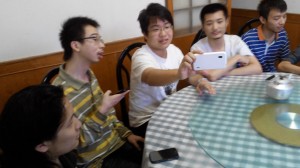 IMG_20130608_174638
IMG_20130608_174638 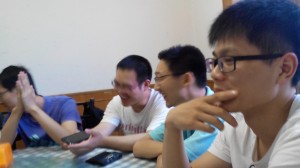 IMG_20130608_175353
IMG_20130608_175353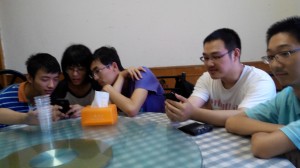 IMG_20130608_175407
IMG_20130608_175407
USTC LUG originated from LUD (Linux User Dinner). As early as 10 years ago, a group of Linux early birds in the school often got together for meals, exchanging technology and feelings. The Linux User Association was registered to better carry out activities. Some people might think that the discussions at LUD are all about advanced technology, but that’s not the case! At the dinner table, we talk about everything from romance, embarrassing incidents, to courses. Come join LUD! (Tip: When we say “Chuanhui International”, we are actually referring to the “Chuanhui Restaurant” on Huangshan Road. From the east gate of the west campus, go north, turn right at Huangshan Road, and you will find this inconspicuous sign 50 meters away)
Linux Makes Everything Simple
Held on April 21, 2013, in Classroom 3121 of the West District. This is part of a lecture co-organized with the Computer Science Student Union, and also the only remaining part. Due to the event being delayed for two weeks, our cooperation with the Computer Science Student Union was not very good, and in the end, we basically organized it ourselves.
After several previous practices, my “The Journey of Computers and Networks”, Guo Jiahua’s “Linux Makes You Understand Computers Better”, and Shen Da’s “Lovely Python” did not encounter the problems found in previous presentations.
The number of people who came to this event was not as many as I imagined, and I don’t understand why. The change in market share, even the CEOs of big companies may not be able to find the exact reason. We may need more and earlier publicity, and show more fun things.
Ubuntu & Debian Release Party
Held on May 11, 2013, in the Academic Lecture Hall of the West District.
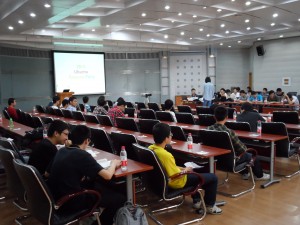 SAM_0101
SAM_0101 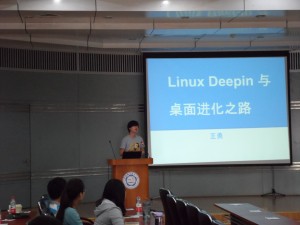 SAM_0113
SAM_0113 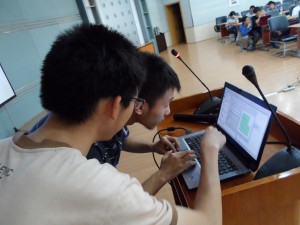 SAM_0160
SAM_0160 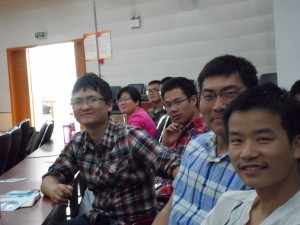 SAM_0157
SAM_0157
First of all, I need to clarify that this event was not organized by me, but by the “new leadership collective” after the change of office. The venue layout for this event looks very peculiar, actually because there were other activities afterwards, and the staff had set up the venue in advance. In fact, the effect of such a venue is quite good.
This event invited Wang Yong from Deepin to explain the development history of the Deepin desktop, and distributed the Deepin 12.10 internal preview version CD. The new CTO and CNO of LUG respectively brought the introduction of LUG network services and “Try Ubuntu with a Different Mood”.
Here are a few suggestions for the students who gave the presentations:
- Stand firm, look straight ahead (not standing at attention), otherwise it’s hard to get a frontal shot…
- The presentation should be mainly pictures, don’t put too much text.
- When speaking, just treat it as chatting with classmates, don’t feel too formal, jokes are okay.
Activity Summary
I’m not good at playing, so the activities I organize are not very attractive, which is my dereliction of duty. However, organizing these activities makes me feel relaxed and natural when facing a scene of hundreds of people. Therefore, during the Microsoft Student Summer Camp, although I was not the organizer of the activity, I dared to wander around in the field and chat with the players of each team - our LUG has also organized activities of this scale! (Although the activity time is only half a day)
Network Services
In addition to organizing activities, LUG also maintains many important network services.
Mirrors
http://mirrors.ustc.edu.cn/ just recovered from a serious disk failure a few days ago. It is the largest open source software mirror in mainland China’s universities, with nearly tens of millions of HTTP accesses every day and a daily average traffic of over 4TB. Mirrors is the official source of a large number of Linux distributions such as Debian, CentOS, Ubuntu in China, and tens of thousands of servers and PCs use USTC mirrors to install and update software packages every day.
The operation of Mirrors has not been very stable recently, which is mainly related to my “Great Leap Forward” style of adding sources regardless of the machine’s load capacity since I became the de facto maintainer of mirrors. In July, when mirrors failed, we did not restore the service as soon as possible, but spent several days messing with unfamiliar Xen and LXC virtualization. This lesson must be learned. When a failure occurs, the primary goal is to restore the service as soon as possible, and do not use unfamiliar technology in the production environment.
At present, what mirrors needs most is to improve monitoring and alarm mechanisms, and do some log analysis. If nothing else, mirrors will become the first SourceForge mirror in mainland China by the end of this year.
PXE
http://lug.ustc.edu.cn/wiki/server/pxe/start provides various network boot services for USTC campus network, such as network installation of Linux, library query machine system, practical system maintenance tools, etc.
PXE has been running very stably in the past year, only a few distribution LiveCDs and Installers have been updated. The resolution problem of the new library query machine in the East District has not been resolved. Kim Jong-un said, “A person who is not loyal to the party and the leader, no matter how outstanding his military talents are, is useless to us.” Of course, his words cannot be fully believed. However, when it comes to companies or any organization, this sentence makes sense. The highest position in the company is the “Chief Executive Officer”, which clearly illustrates the importance of “execution”.
Sometimes I also have the problem of looking forward and backward, and I was criticized by Brother Zhang Cheng in the mailing list: if you have an idea, just do it, don’t think too much; if you do it, publish it as soon as possible and let users find problems. This seems to contradict the “mirrors Great Leap Forward” mentioned earlier. In fact, the mistake of mirrors is not in adding sources, but in not fully understanding the architecture of mirrors before adding sources, and not monitoring the operation status of existing sources.
Blog
http://blog.ustc.edu.cn/ WordPress blog hosting service is similar to wordpress.com. USTC students can register blogs, freely install plugins and themes, and theoretically can run any code, which is the biggest difference from Sina blogs and the like. Each blog also has a USTC exclusive domain name of yourname.blog.ustc.edu.cn, you know, it’s not so easy to get a domain name in the education network.
Freeshell
http://freeshell.ustc.edu.cn/ is a virtual machine (VPS), mainly used for scientific computing and algorithm experiments, and all USTC students can register. Freeshell uses OpenVZ virtualization technology to achieve resource sharing between virtual machines. In idle situations, each virtual machine can occupy the CPU and memory resources of the entire physical node, which is very suitable for freeshell’s low usage scenario.
GitLab
http://gitlab.lug.ustc.edu.cn/ is a code hosting and project management service similar to GitHub, supporting open source projects and private projects, and built with open source GitLab software. Most of LUG’s project codes are hosted here and open source released, just register an account to see. I often use GitLab, and all kinds of code I write at school are managed by GitLab, which is very convenient.
The Mystery of Network Services
As early as 2010, LUG had ambitious development plans, but none of them were realized. My plan is not too ambitious, so I have achieved some, but many promised features, including the blog contest, have been dragged to now. My current view is that we are an interest group, not a commercial company. Our USTC has a heavy academic burden, and developing and maintaining a deliverable software is not something LUG can afford. Every time I bring out the blog and freeshell in the interview, the interviewer will be surprised.
About the “development team”, I personally think this is quite nonsense. First of all, it takes a lot of time to state your ideas to another person, and you may not understand it; secondly, you don’t pay me, why should I listen to your command; finally, you may have heard of the 10 times difference between good programmers and bad programmers, I’m not saying that there are bad programmers in LUG, but everyone has their own expertise, and the time cost of familiarizing with the environment is too high. Therefore, I believe that LUG’s network services should be “who proposes, who implements, who maintains”, and the server maintenance team is only responsible for managing accounts, allocating resources and monitoring service operation status. This can fully stimulate everyone’s imagination and creativity, and create more interesting things.
Where is LUG heading?
When I wrote this title, I felt it was too big. This is indeed not what I should say now, perhaps it is more appropriate for LUG veterans including jameszhang and Yu Jie to say. However, since it is a summary, we must look to the future, and the style cannot be too low.
What is LUG? I used to think that LUG is a collection of people who mess with Linux based on appearances. I think this is more likely because Linux is suitable for us to mess with, that is to say, we are naturally some people who like to mess with, and Linux is just to our taste. Starting from the last century, MIT has always had some students who like to mess with, and they have made all kinds of pranks (don’t let me Google that for you if you haven’t seen it). In the 1970s, some college students who liked to mess with used the UNIX platform and were called UNIX hackers; in the 1980s, messing with DOS became the mainstream of computer geeks; entering the 21st century, Linux allowed us to step into a mature modern operating system and put it like Lego. Disassemble and reassemble according to your own wishes.
After leaving school, we found that this experience of messing with is precious, because it allows us to understand computers better, know a little about the principles of each software, and not like some frogs at the bottom of the well who have been immersed in a certain closed-source operating system for a long time. , regard everything as a “none of my business” black box and a “fragile” vase. I think this is the most realistic meaning of LUG to each participant.
Dean Hong Xiaowen of MSRA said that a company, even if it does basic research like Microsoft, can only look at five or ten years, because there are too few companies that can survive for a hundred years; and there are many schools with a history of a hundred years, so schools can consider things after a hundred years. I think, Internet companies and university LUGs are quite suitable for this analogy. Internet companies may have TB bandwidth drizzle, PB data trivial matter, but we LUG do not have to envy or even follow this; LUG has its own freedom, sharing, and messing culture, like LUD, like weekly gatherings, together with those distributions we have messed with together , Open source software and network services will be our lifelong memories.
I wish LUG will be better tomorrow.
LUG this year
- On July 17, 2012, czluck proposed a reform plan for the SFD booth.
- On August 5, 2012, mirrors added Homebrew mirror.
- From September 10th to 14th, 2012, LUG participated in the unified recruitment of clubs.
- On September 15, 2012, the Software Freedom Day Hefei Station was held in the multi-function hall of Xi Huo, and the revised “Linux Beginner’s Guide” was distributed.
- On September 22, 2012, the LUG member conference was held in Classroom 3123.
- On September 27, 2012, discussed the development of LUG with jameszhang.
- On October 14, 2012, visited the Network Center and Supercomputing Center.
- On October 16, 2012, the LUG mailing list Archive was launched.
- On October 24, 2012, the LUG ServMon HTTP monitoring alarm service was launched.
- On November 24, 2012, the Linux User Party was held in the Water Report Hall.
- On November 27, 2012, USTC Blog was launched.
- On December 31, 2012, the LUG library was handed over from goodchong to Darcy Shen.
- On January 4, 2013, USTC Freeshell was launched.
- On January 6, 2013, mirrors added disk array.
- On February 5, 2013, a hard disk full failure of mirrors was discovered.
- On March 13, 2013, the possibility of establishing a mirror site alliance was proposed.
- On March 14, 2013, the GitLab code hosting service was launched.
- On April 9, 2013, GitLab switched to an independent virtual machine.
- On April 18, 2013, mirrors lab was established.
- On April 21, 2013, the “Linux Makes Everything Simple” event was held in Classroom 3121.
- On April 27, 2013, the DNS of all LUG domains was switched to DNSPod.
- On April 27, 2013, the LUG handover meeting was held in the LUG activity room.
- On April 28, 2013, a large wave of new mirrors synchronized by mirrors-lab was launched.
- On May 11, 2013, the Ubuntu & Debian Release Party was held in the West District Academic Report Hall.
- On May 12, 2013, Zen jyu Wong succeeded as the librarian.
- On June 1, 2013, the first iscsi failure of the mirrors disk array occurred.
- On June 26, 2013, the second iscsi failure of the mirrors disk array occurred, and due to incorrect operations and improper rebuilding process, the service was interrupted for 5 days.
- On July 20, 2013, USTC Blog was upgraded and plugin issues were fixed.
- On July 23, 2013, mirrors added SSD.
- On July 29, 2013, LUG’s own DNS was set up.
- On August 19, 2013, Freeshell supports access to the external network, and servers.blog.ustc.edu.cn was launched.
- On August 20, 2013, signed an agreement with SourceForge to do a mirror site.
- On August 31, 2013, a disk failure occurred in mirrors, and the service was interrupted for 2 days.
Note: Those not on this list may not be unimportant, such as the weekly gatherings are already listed on the wiki page, so I won’t copy and paste it again. The complete list of LUG activities is at http://lug.ustc.edu.cn/wiki/lug/events
